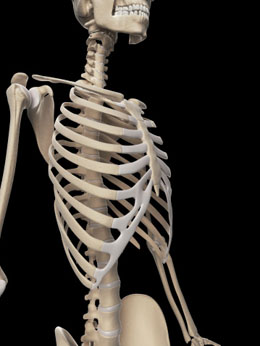The feeling of pressure under right rib cage in most cases is associated with pressure or pain in the chest area. This article gives you some inputs on what could this symptom mean.

As mentioned already, pressure that is experienced under the rib cage could be associated with chest pain. Although chest pain could be caused by many conditions, we cannot ignore the fact that it is also an important symptom of heart attack. Most people describe chest pain as a pressure that keeps building up in the area, while for some, it may be a squeezing feeling. Millions of people every year come up with the complaint of chest pain, and get themselves evaluated by a doctor.
Accompanying Symptoms
If the pressure under the rib cage is getting frequent, and accompanied by the symptoms listed below, then it is most likely that it is associated with heart attack. The symptoms include:
- A feeling of the chest getting tighter or heavier
- A sharp, shooting pain that may be felt to be radiating to the shoulders, jaw, arms, and neck. A pain in the left arm is a more specific sign of a heart attack, which occurs with a pressure in the chest/rib cage
- A pain that might occur in varying intensity; comes and goes, becomes mild and then severe
- Difficulty breathing
- Profuse sweating
- Nausea
- Dizzy spells
Possible Causes
- One major cause of the problem could be a heart attack, as discussed already.
- Plaques may accumulate in the arteries thus, narrowing them and hampering the blood supply. So when the heart stops receiving the oxygen-rich blood, it can give rise to pressure that can be felt in the rib cage area, along with a chest pain.
- The pressure might also be a symptom of a traumatic injury to the chest or uncontrolled hypertension. This may also give rise to a sudden, grueling chest pain that can be felt tearing through the back. This condition is known as aortic dissection; often a life-threatening medical issue.
- In certain situations, the arteries that supply blood to the heart may suffer from painful and involuntary muscular contractions (spasms). And actions such as this may stop the blood flow temporarily, thus causing pressure in the rib cage.
- In some cases, a condition of liver inflammation could also be indicated by pressure or pain under the right rib cage.
- Some people experience the pressure in the form of a pinch, especially while bending or exercising just after eating. In such a case, acid reflux could be a potential cause.
Pressure and pain under rib cage is not a condition but one of the several symptoms that occur along with chest pain that is associated with the cardiovascular health of the person. So the treatment would not only be individually focused on dealing with the pressure, but would also help in keeping the heart from getting worse. Medications involved in the treatment may include:
- Aspirin (for preventing blood clot)
- Drugs for widening narrowed blood vessels
- Beta blockers (for reducing blood pressure, and relaxing heart muscles)
- Drugs for destroying blood clots
- Medications for helping the blood to flow smoothly from the heart
- Calcium channel blockers to prevent spasm
If the diagnosis confirms an impending heart attack, then some other drugs, and probably surgical procedures may be recommended to deal with the situation. And if acid reflux is an offender, then following a few self-care measures could help. Avoid alcohol, caffeine, spicy and fatty foods. Such foods trigger acid reflux easily. Avoid smoking, bending or exercising after eating, as such activities may also cause pressure and pain under the rib cage.
Pressure under rib cage, not in all cases, may be an indication of a heart attack. As aforesaid, it could be a result of an injury to the chest, or acid reflux. But unfortunately, in most cases it is. So if you have this symptom along with other symptoms listed above, then call 911 or get immediate help, as this might indicate a heart attack.


 As mentioned already, pressure that is experienced under the rib cage could be associated with chest pain. Although chest pain could be caused by many conditions, we cannot ignore the fact that it is also an important symptom of heart attack. Most people describe chest pain as a pressure that keeps building up in the area, while for some, it may be a squeezing feeling. Millions of people every year come up with the complaint of chest pain, and get themselves evaluated by a doctor.
As mentioned already, pressure that is experienced under the rib cage could be associated with chest pain. Although chest pain could be caused by many conditions, we cannot ignore the fact that it is also an important symptom of heart attack. Most people describe chest pain as a pressure that keeps building up in the area, while for some, it may be a squeezing feeling. Millions of people every year come up with the complaint of chest pain, and get themselves evaluated by a doctor.